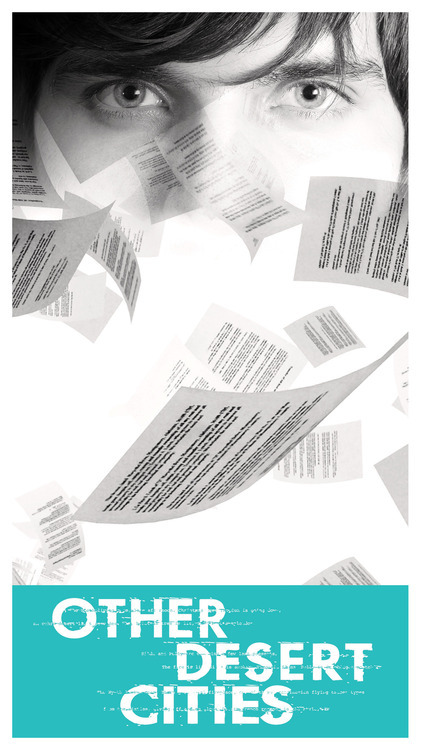Other Desert Cities: Dysfunction with a Twist
Other Desert Cities delivers many surprises.
One of them changes the game.
You’ve heard the adage: Don’t let a good deed go unpunished.
 That seems to have been the state of mind of Jon Robin Baitz when he was unceremoniously thrown off the successful ABC-TV series, “Brothers and Sisters,” a show he had created and for whose success he was largely responsible as a writer/producer.
That seems to have been the state of mind of Jon Robin Baitz when he was unceremoniously thrown off the successful ABC-TV series, “Brothers and Sisters,” a show he had created and for whose success he was largely responsible as a writer/producer.
The parting was rancorous. It was a Hollywood mess Baitz was stewing about in such a dark mood that he promptly set about doing what writers do: find another writing project to absorb all those annoying feelings as he sat down to write Other Desert Cities. Rancor with humor to the rescue, plus a few other emotions that were exactly what the doctor ordered.
Other Desert Cities also happens to be a play about brothers and sisters—only more so. It’s about family (not to be confused with a family play). Like all families, this one has its joys, pleasures, angers, trivia, eccentricities, good will, irritations and secrets. It has a father, the retired star of some second-tier films and other sundries who plays golf a lot and lives in Palm Springs; it has a mother who used to write second-string films and is now a cheery career advice-giver; it has a semi-witty, semi-conscious sister-in-law, fresh out of rehab and good with zingers; it has a compliant son, a successful producer of reality TV; finally, it has the main ingredient—a rebellious daughter, a novelist with one book to her credit and, in her suitcase, one that is about to be published.
In short, it is a family like every other, except that this daughter is on the verge of committing a cardinal family sin. She has come to Palm Springs from her home in New York for the holidays, but the spicy new memoir taking up room in her luggage may blow up the family by revealing a long-buried family tragedy. Happy New Year, everyone.
This may not sound wildly original so far, but Baitz is no second-hand Johnny. He keeps the suspense cooking to a peak of sizzle until, inevitably, the meat of this story emerges bruised, charred and surprisingly tasty.
 Question of the day: what exactly is it that makes dysfunctional people, betrayers of one another, so endlessly interesting on stage? Couldn’t we just as easily sit at home and ponder on their alter-egos, all of whom seem to be roosting somewhere in our own extended family tree? Do we really need to pay good money to watch a crisis on display? What makes these characters deliver such lip-smacking theatre?
Question of the day: what exactly is it that makes dysfunctional people, betrayers of one another, so endlessly interesting on stage? Couldn’t we just as easily sit at home and ponder on their alter-egos, all of whom seem to be roosting somewhere in our own extended family tree? Do we really need to pay good money to watch a crisis on display? What makes these characters deliver such lip-smacking theatre?
The short answer is the Gossip Factor. GF for short.
The long answer? Really now, what would there be to say about a perfectly happy family? Not even enough for a 30-minute one-act. Have you ever seen the life and times of a happy family make the evening news? “Went on a great picnic today…” Without conflict or mystery, without some major confrontation or scary, unsolvable issue, no black sheep, no 11-o’clock speech, without the gossip who wants to listen?
The GF is the lubricant—the acid that drives the drama. It drove Hamlet to create situations that resulted in six members of the Danish court dead, himself included. The consequences of King Lear’s actions are not pretty either—torture, bad behavior, lust, madness, poisonings, deaths. O’Neill’s Tyrone family is spooked by drugs, alcohol and unhappiness in that very Long Day’s Journey Into Night. Arthur Miller’s salesman goes to an early grave, and his son to a life of perpetual failure, while King Oedipus faces misery, self-inflicted blindness and exile. August: Osage County? The geography may be different, but there’s another family gone fearfully awry.
All these folks are not having fun, but for some reason we are. Our emotions are given a real workout, which is what emotions are for. We can feel these people’s pain and simultaneously be relieved and happy that it’s happening to them and not us. That’s the dynamic. It’s why we’re mesmerized by murders, hurricanes, tsunamis, road kill and other such carnage. Besides, Baitz, an expert in the field, has provided not only characters that are interesting to listen to and watch, but also characters that turn out to be considerably less predictable than their literary forbears. That may be the best news of all about Other Desert Cities, because that particular endgame is, indeed, a fresh one.
It will not be revealed here. (What would be the point of seeing the play if we were to tell you the most remarkable thing about it?)
Suffice it to know that Baitz has pretty much outdone his predecessors. He has bested them by showing that real life—plays of this nature are always based on real life—is more complex, more interesting and a lot more bewildering than the history of the theatre (so far) might have led you to believe. Which brings us to the most important element the playwright has injected into his play: a strong dose of the unexpected.
When you combine shock, intelligence, humor and unpredictability you get a combustible situation that gives Other Desert Cities its theatrical edge. It also happens to be well written. There is tragedy at the root of this tale elegantly disguised as comedy, and the characters that inhabit this large, sunny living room are skilled at papering over their concerns with wisecracks and minutiae. The veneer of respectability they’ve shouldered for so many years is a gleaming suit of armor with which to stave off the inquiring world. It masks what they want no one to see and what they would rather not remember, even if it is the proverbial elephant in the room. But when that privacy is threatened from within, they defend it with a core of dignity (and a long-buried kernel of truth) that one might not have thought possible.
That is the gold that Baitz delivers—the fun part, the sadness, the fix and the demystification. It lifts the play onto another, more complex plane. At that elevation there is a silence and a giddiness that an audience may not have foreseen—and it is neither the road to Mecca nor the path to hell.
Other Desert Cities plays Denver’s Space Theatre March 29-April 28, 2013. Tickets: 303.893.4100 or 800.641.1222.
1 note
 sheisalittlebitdramatic-blog reblogged this from denvercenterblog
sheisalittlebitdramatic-blog reblogged this from denvercenterblog denvercenterblog posted this
